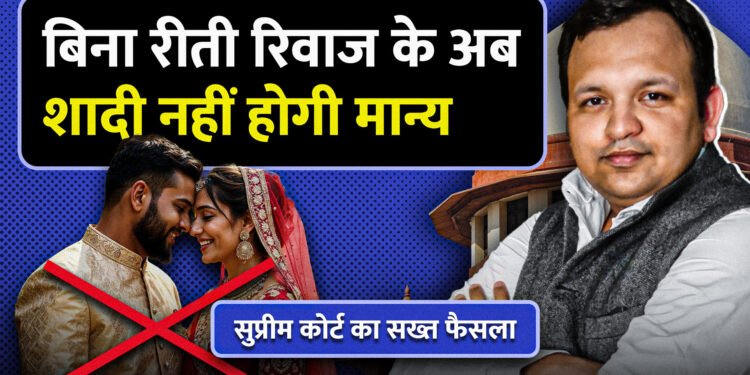Introduction
The Supreme Court’s ruling in the case of Doly Rani vs. Manish Kumar Chanchal is a pivotal moment in Indian family law. The case addressed critical issues surrounding marriage validity, deceit in matrimonial relationships, and the legal rights of individuals who are victims of fraud. This judgment not only reaffirmed the importance of transparency and honesty in marriages but also reinforced the protection of women under the law. Here, we will explore the facts of the case, the legal provisions examined, and the Court’s final decision.
To learn more about the topic, read the blog till the end, and if there lies any more doubt, feel free to reach out to us at; https://thelegalshots.com/legal-opinion/
Facts of the Case
The case began when Doly Rani, the petitioner, approached the Court seeking annulment of her marriage to Manish Kumar Chanchal, the respondent. The marriage was solemnized in 2016 through traditional Hindu rituals. Doly claimed that she entered the marriage unaware that Manish was already married to another woman, a fact he had intentionally concealed.
Soon after the marriage, Doly discovered Manish’s existing marital status, which led to emotional distress and a sense of betrayal. She alleged that the marriage was a result of fraudulent misrepresentation and sought legal intervention to declare it voidable.
Manish, on the other hand, denied the allegations, asserting that their marriage was valid under the law. However, the evidence provided, including marriage certificates and testimonies, revealed the truth about his prior marriage, which he had kept hidden from Doly.
Laws Explained
- Section 5 of the Hindu Marriage Act, 1955: This section enumerates the conditions for a valid Hindu marriage, including the stipulation that neither party should have a living spouse at the time of marriage. Manish’s existing marriage made the union with Doly legally void.
- Section 12 of the Hindu Marriage Act, 1955: This provision permits a marriage to be annulled if consent was obtained through fraud or misrepresentation. The Court acknowledged that Manish’s concealment of his marital status fulfilled this condition.
- Protection of Women from Domestic Violence Act, 2005: The judgment referenced this Act to address the emotional and psychological abuse inflicted upon Doly due to the deceit.
- Article 21 of the Constitution of India: The Court emphasized the petitioner’s fundamental right to live with dignity, which includes the right to be free from deception in personal relationships.
The Supreme Court’s Judgment
The Court ruled in favor of Doly Rani, declaring the marriage voidable due to fraud. It emphasized that no relationship could stand on a foundation of deceit. The Court also ordered compensation for the petitioner to address the harm caused by the respondent’s actions.
My Point of View
This judgment is a victory for justice and a reminder that the judiciary stands as a protector of individual rights. Fraudulent marriages not only violate personal trust but also undermine the sanctity of the institution itself. The Court’s decision highlights the need for individuals to be truthful in their commitments and for the law to act decisively when such truths are compromised.
For legal professionals, this case underscores the importance of meticulously handling matters of marital fraud. It’s a wake-up call for everyone to ensure transparency in relationships, as the law is unambiguous about its stance on deceit.
Conclusion
This case teaches an important lesson: marriage is a bond that thrives on honesty and trust. Concealing crucial information, such as a prior marriage, not only causes emotional trauma but also invites serious legal consequences.
As individuals, it’s essential to perform due diligence before entering a marriage. Understanding legal rights and obligations can save people from falling prey to deceit. For women, particularly, this case is a reminder to assert their rights and seek justice in cases of misrepresentation.
The Supreme Court’s judgment in Doly Rani vs. Manish Kumar Chanchal reinforced the importance of honesty and transparency in marital relationships. The Court ruled in favor of Doly Rani, declaring the marriage voidable due to the fraud committed by Manish. This case highlights that any deception, especially regarding an existing marriage, undermines the validity of the second marriage and gives the wronged party the right to seek legal recourse.
This judgment serves as an important reminder of the need to protect individuals, particularly women, from fraudulent practices in personal relationships. It also underscores the Indian judiciary’s commitment to upholding justice, protecting the sanctity of marriage, and ensuring the dignity and rights of individuals involved in marital disputes.
If doubts still persist, contact our Legal Experts at https://thelegalshots.com/legal-opinion/




